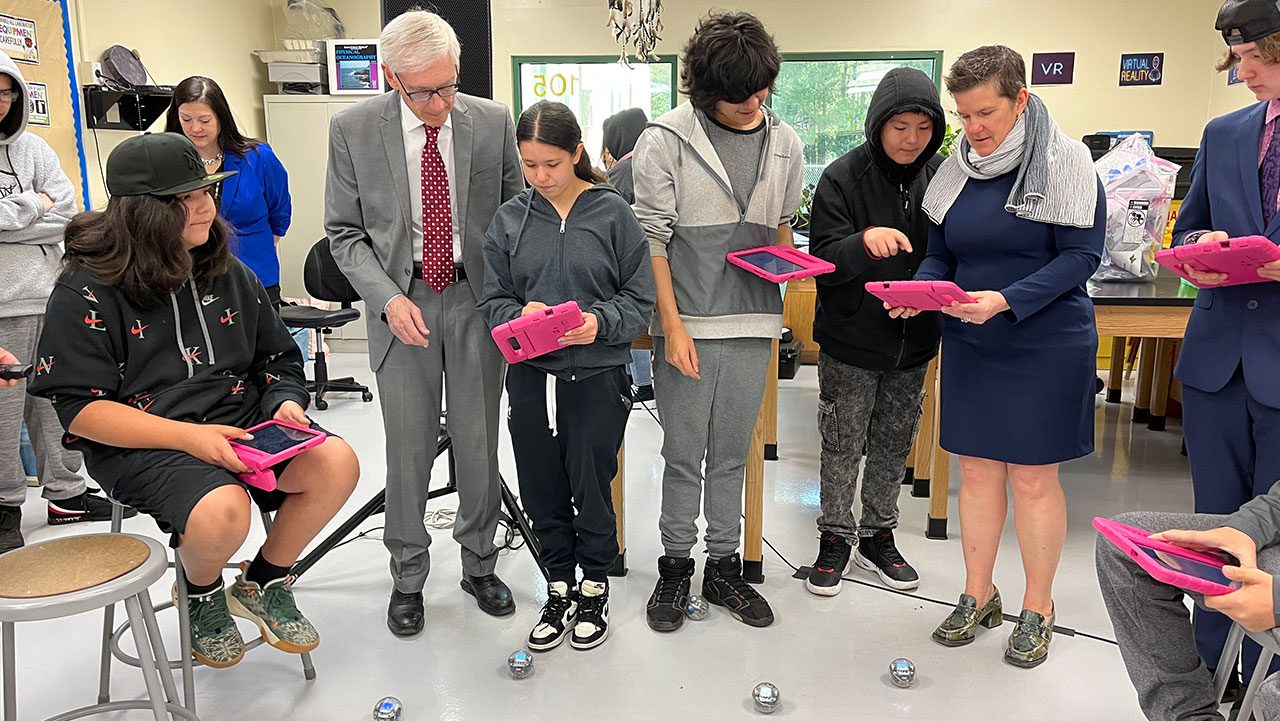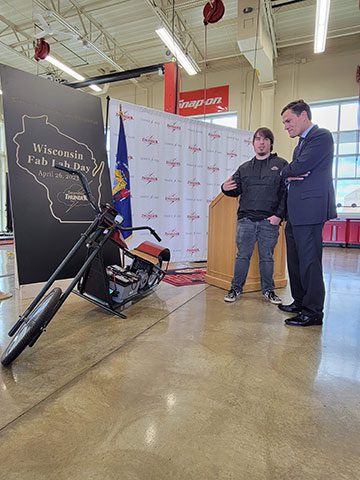
Gov. Tony Evers and WEDC Secretary Missy Hughes interact with students at the Lac Courte Oreilles Ojibwe School.
LAC COURTE OREILLES RESERVATION — Gov. Tony Evers, together with Wisconsin Economic Development Corporation (WEDC) Secretary and CEO Missy Hughes, today announced that Lac Courte Oreilles Ojibwe School and 24 other schools around the state will receive more than $560,000 in fab lab grants to train students in science, technology, engineering, arts, and mathematics (STEAM) skills and prepare them for careers using advanced technologies.
“If we want our kids to be successful, we need to make sure they have the skills and tools they need to join the 21st-century workforce,” said Gov. Evers. “Fab labs are important tools to help students gain the skills, expertise, and equipment necessary to become the industry leaders of tomorrow, and we’re proud to be awarding funds to 25 school districts today so they can establish or expand their fab lab programs, which will continue to provide benefits to for students, community members, and businesses across our state.”
A fab lab, short for fabrication laboratory, is a high-technology workshop equipped with computer-controlled manufacturing components such as 3D printers, laser engravers, computer numerical control (CNC) routers, and plasma cutters. Through its Fab Lab Grant Program, WEDC is supporting the purchase of fab lab equipment for instructional and educational purposes for K-12 students across the state.
Lac Courte Oreilles Ojibwe School, which is the first Tribal school to be awarded a fab lab grant from WEDC, is receiving $19,920 to establish a fab lab facility and support their existing STEAM courses. The school plans to use the grant to purchase four 3D printers, three Cricut machines, two laser engravers, two STEM lab sensor kits, and a decal machine. Students will have the opportunity to learn how to program and use these new machines, and the school hopes to integrate student-led, instructor-facilitated learning in its fab lab space. Additionally, the program aims to provide fab lab classes for community members, led by the Lac Courte Oreilles Ojibwe University.
“Fab Labs allow businesses and schools to work together to provide students with STEAM education that will translate into real-world career skills,” said WEDC Secretary Hughes. “Fab labs benefit not only the students themselves with important technology and career skills, but they’re also a win for Wisconsin employers who will be able to find workers with the right skills to allow their companies to grow and thrive.”
WEDC has invested more than $4.5 million over the past eight years to provide 118 schools across the state with the equipment necessary to help students learn high-demand skills, including technology, manufacturing, and engineering.
The equipment purchased by Lac Courte Oreilles Ojibwe School will benefit their student body throughout their elementary, middle, and high school, as well as Waadookodaading, the Ojibwe language institute. The school is dedicated to culturally responsive and sustaining STEAM education. Students have had the opportunity to participate in a variety of educational programs and career-building experiences, including the Student Space Flight Experiments Program, where a winning team of Lac Courte Oreilles Ojibwe School students was able to send an experiment to the International Space Station.
“This grant is huge for us,” said Tammy Moncel, science teacher at Lac Courte Oreilles Ojibwe School. “We’re seeing a huge need and interest in fabrication and technology-based skills. The students are really excited about these opportunities.”
The fab lab will also benefit the school’s community partners, including the Lac Courte Oreilles Conservation Department, Lac Courte Oreilles Ojibwe University, and the Civil Air Patrol. The community partners have donated their time and expertise to help students explore new subjects, learn new skills, and discover new careers.

A student from the Seymour Community School District explains the project he and other students worked on to Deputy Secretary Sam Rikkers during a visit for the eighth annual Fab Labs Day.
WEDC Deputy Secretary Sam Rikkers will be visiting the Seymour Community School District today to celebrate Wisconsin’s eighth annual Fab Labs Day. The school district received a $25,000 fab lab grant to expand its existing fab lab facilities used by students, community members, and businesses alike.
“Seymour is our home, and we want to see the community and school grow,” said Kurt Schuh, owner of Schuh Construction and a Seymour native. Schuh Construction, a second-generation family-owned business located in Seymour, supports the fab labs program by donating supplies, providing work-site tours, and mentoring students.
Rylee Geiger, a senior at Seymour High School, will be attending Northeast Wisconsin Technical College next year to study automation engineering.
“The fab lab has allowed me to step out of my comfort zone and put myself in challenging situations where I need to be precise and attempt to expand my imagination by looking at things from multiple perspectives,” Geiger said. “By designing things, I am putting tests and experiments into play to see how well everything looks, and if some things don’t go to plan, there are plenty of other ways that I was taught to fix the mistake. The fab lab has allowed me to explore my interests in designing and allowed me to experience how to make these ideas into working projects to my liking.”
Lac Courte Oreilles Ojibwe School was one of 12 first-time fab lab grant recipients. In total, $560,053 in state grants were awarded. The following school districts were awarded fab labs grants this year:
- Barneveld School District – $20,000
- Cedar Grove-Belgium School District – 25,000
- CESA 3 – $49,650
- Cornell School District – $25,000
- Elmbrook School District – $25,000
- Elmwood School District – $24,780
- Gresham School District – $25,000
- Hayward Community School District – $25,000
- Lac Courte Oreilles Ojibwe School – $19,920
- Markesan District Schools – $25,000
- Montello School District – $25,000
- Nicolet Union High School District – $25,000
- Northland Pines School District – $25,000
- Omro School District – $17,485
- Prentice School District – $3,850
- River Falls School District – $25,000
- School District of Albany – $9,904
- School District of Belleville – $16,600
- School District of Black Hawk – $25,000
- School District of Fort Atkinson – $25,000
- School District of Mishicot – $25,000
- Seymour Community School District – $25,000
- Sparta Area School District – $6,197
- Weyauwega-Fremont High School – $16,667
Individual school districts were eligible for up to $25,000, and consortiums of two or more districts were eligible for up to $50,000. The program requires matching funds from each district. WEDC received 25 applications this year, and grants were awarded on a non-competitive, first-come, first-served basis.
In addition to the grants, WEDC has developed a fab lab resources page for its website that provides districts with information on how to set up and equip a fab lab, how to implement best practices to ensure a successful fab lab, and more. Content for the page was provided by the University of Wisconsin-Stout and Fox Valley Technical College.
For more information on the state’s fab labs, including resources for teachers, visit wedc.org/fablabs or follow #WIFabLab on Twitter.
